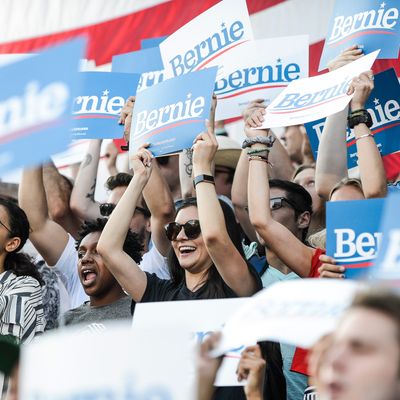
American presidential politics offers the curious many mysteries to consider. Why is John Delaney still running for president? Does any voter under the age of 45 know who Bill Weld is, or that he’s technically a Republican candidate for president right now? Did Howard Dean’s warlike yawp really destroy his presidential campaign in 2004? The state of public discourse suggests another, interesting open question: “Why does the young left hate Pete Buttigieg?”
Writers have proposed different explanations. “The gravitational center of the rage against Buttigieg has been Very Online,” Charles Homans recently wrote for The New York Times Magazine, “as has the maximalism of its tone — its insistence that Buttigieg, by thriving within the American architecture of capitalism and privilege, must personally embody all its worst qualities.” In a December piece for The Atlantic, Derek Thompson identified four possible sources of youth hostility toward Buttigieg. “The South Bend, Indiana, mayor doesn’t offer any kind of New Deal, Green or otherwise. Rather, he offers one of the oldest deals in politics: generational change without class warfare,” Thompson summarized.
On Wednesday, in a piece with a headline nearly identical to Thompson’s, Politico magazine offered its own take on the anti-Buttigieg left. “The unspoken truth about the furor Buttigieg arouses is that his success threatens a core belief of young progressives: that their ideology owns the future, and that the rise of millennials into Democratic politics is going to bring an inevitable demographic triumph for the party’s far left wing,” Derek Robertson wrote.
But I think the question posed in these stories answers itself: Voters on the left do not support Buttigieg because his politics places him to their right. This simple answer seems to be discounted, when it is considered at all. The arrival of the young left as a meaningful force in electoral politics is a relatively recent event. But generalizations don’t get readers much closer to understanding why that arrival matters, or what its fledgling efforts might portend for the future.
Young progressives do not believe, as Robertson claimed, that their ideology “owns the future,” in the sense that their victory is preordained. Rather, they believe that their politics map out the only way to the best version of the future. The language of struggle, of crisis and urgency, is far more common than arrogant triumphalism. Members of the Sunrise Movement occupied Nancy Pelosi’s offices because they did not want to inherit a dying planet; the demands of the Green New Deal are exactly as radical as the danger its supporters believe we all face. Similarly, demands for student debt forgiveness, free public college, Medicare for All, and the expansion of voting rights aren’t products of left-wing complacency. They’re strategies, proof that their architects and supporters believe their triumph is far from inevitable.
For these reasons, Thompson is correct when he writes that left-wing activists want “to transform the U.S. political economy.” Most leftists also believe that transformation is impossible without struggle, though they disagree — usually acrimoniously — on which reforms that struggle ought to prioritize and what tactics it ought to employ. To them, Buttigieg isn’t an obstacle in the path toward their predetermined victory. They’re fighting a war, and centrists like the former mayor are on the wrong side. At stake is the future itself, an uncertain and perilous thing. To the left, the moral arc of the universe does not bend inevitably toward any outcome, let alone justice.






























